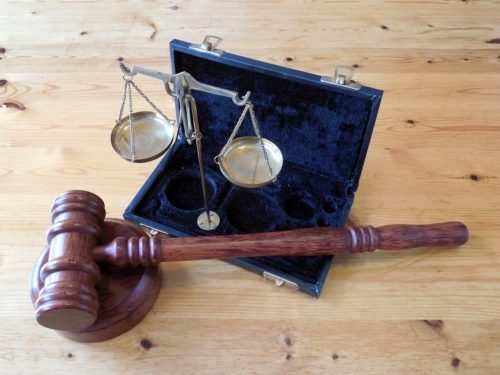
Woman convicted of sexual assault in HIV-disclosure case appeals to Supreme Court
Marjorie Schenkels granted release from jail on Thursday
A Manitoba woman convicted of aggravated sexual assault and sent to jail for not telling a sex partner she had HIV is hoping to bring an appeal of her controversial case to the Supreme Court of Canada.
MX has filed an appeal application with Canada’s top court just a few weeks after Manitoba’s Court of Appeal refused to grant her a new trial.
The provincial appeals court did agree on Thursday, however, to grant X bail from the Women’s Correctional Centre near Headingley, pending a decision by the Supreme Court on whether it will hear her case.
X was convicted by a jury and sentenced in 2016 to two years less a day in jail plus probation to follow.
She had unprotected sex with a friend three times and didn’t tell him of her medical status out of fear. The man she had sex with tested positive for HIV in 2011. X didn’t concede during her trial that she’d infected him.
Her provincial appeal was mainly fought on two grounds — that her rights were breached because her case took so long to get to trial, and that the Crown failed to prove beyond a reasonable doubt the victim was HIV-negative before he and X had unprotected sex.
The Crown argued its job was to prove beyond a reasonable doubt that X could have infected the complainant.
“There was no evidence presented to the court that HIV could have been transmitted any other way,” prosecutors said. The victim did not inject drugs and there was no evidence to suggest he was having sexual relations with anyone else during that time, said the Crown.
The Manitoba appeals court agreed.
“The weakness of the defence theory is that there was no evidence as to other possible ways in which the complainant could have contracted HIV,” Justice Barbara Hamilton wrote in a 42-page decision released June 29.
“Without such evidence, the accused was asking the jury, and now this court, to speculate. She is asking this court to focus on hypothetical alternative theories that have no basis in the evidence.”
The court also dismissed her argument the case took too long to be heard.
Supreme Court has ruled on HIV-assault cases in past
The Supreme Court of Canada has ruled that the consent someone gives to engaging in sexual activity can be considered null and void if the accused person failed to disclose, or lied about, his or her HIV status.
The Crown must also prove the person would not have consented to sex if he or she had been aware of the HIV status.
That can lead to a charge of aggravated sexual assault — the most commonly applied, although there have been others — so long as the sexual contact has either transmitted the virus to the complainant, or put them at significant risk of contracting it.
The high court clarified in 2012 that this would not apply if someone is using a condom and also has a “low viral load,” but advocates argue the law has fallen far behind the science and creates more problems than it attempts to solve.
The fact that HIV non-disclosure falls under aggravated sexual assault or other offences makes statistics harder to come by than they are for other crimes, but the Canadian HIV/AIDS Legal Network has counted at least 180 people charged for offences related to HIV non-disclosure in Canada since 1989.
No date has been set for the court to rule on whether it will hear X’ appeal.
Court upholds sexual assault conviction of woman with HIV who had unprotected sex
Manitoba’s appeal court has rejected an HIV-positive woman’s bid to have her sexual assault conviction overturned after she failed to tell her partner she was infected with the virus.
Marjorie Schenkels was sentenced to two years less a day in jail after a jury convicted her of aggravated sexual assault by endangering life after she had unprotected sex three times with a friend who didn’t know she was HIV-positive. He tested positive for the virus shortly afterward.
Schenkels was found guilty after a five-day jury trial in December 2014 and was sentenced in March 2016. Her appeal was heard in January, and the appeal court released its decision this week.
On appeal, Schenkels argued there was no proof she transmitted HIV to the victim, and that if she hadn’t, she didn’t endanger his life. She argued the jury should have been told the Crown had to prove beyond a reasonable doubt the victim didn’t contract HIV from another source.
The Court of Appeal disagreed, ruling any properly instructed jury could reasonably have convicted Schenkels.
Court of Appeal Justice Barbara Hamilton, writing for the panel of judges, said there was no evidence before the court about other possible ways the victim could have contracted HIV.
“Without such evidence, the accused was asking the jury, and now this court, to speculate. She is asking this court to focus on hypothetical alternative theories that have no basis in the evidence,” states the written decision, issued this week.
During the 2014 trial, court heard the victim had not previously been tested for HIV. He was diagnosed in December 2011, shortly after his last encounter with the accused. Schenkels had been diagnosed in 2009, and her doctors testified she had been warned about the importance of safe sex and failing to disclose her condition to a sexual partner could be a criminal offence.
Defence lawyer Ian Histed also argued the conviction should be thrown out because of unreasonable delay in bringing the case to trial.
It took 30 months and 19 days for the case to wrap up, slightly more than the 30-month deadline that would later be imposed by the Supreme Court for superior court trials. The Crown had authorized a direct indictment in the case, skipping a preliminary inquiry and heading straight to trial. Because there was no preliminary hearing, the defence argued, the case should be subject to even stricter timelines.
Although the jury trial happened before the Supreme Court set new trial deadlines that came into effect last July, Histed argued the case should have been bound by the 18-month deadline that was imposed for provincial court trials even though it took place in the superior Court of Queen’s Bench.
The Court of Appeal refused to throw out the conviction because of delay. It ruled that whether or not there was a preliminary inquiry, the case would still be subject to the 30-month deadline because it was dealt with in the Court of Queen’s Bench. The fact it missed the deadline by 19 days didn’t matter, the court decided, because it was already working its way through the justice system by the time the new deadlines were imposed.
Schenkels was the first woman in Manitoba to be convicted of sexual assault on the basis of failing to disclose her HIV status. As part of her conviction, she will be listed on the sex offender registry for 10 years.
Manitoba’s appeal court has rejected an HIV-positive woman’s bid to have her sexual assault conviction overturned after she failed to tell her partner she was infected with the virus. Marjorie Schenkels was sentenced to two years less a day in jail after a jury convicted her of aggravated sexual assault by endangering life after she had unprotected sex three times with a friend who didn’t know she was HIV-positive. He tested positive for the virus shortly afterward. Schenkels was found guilty after a five-day jury trial in December 2014 and was sentenced in March 2016. Her appeal was heard in January, and the appeal court released its decision this week. On appeal, Schenkels argued there was no proof she transmitted HIV to the victim, and that if she hadn’t, she didn’t endanger his life. She argued the jury should have been told the Crown had to prove beyond a reasonable doubt the victim didn’t contract HIV from another source. The Court of Appeal disagreed, ruling any properly instructed jury could reasonably have convicted Schenkels. Court of Appeal Justice Barbara Hamilton, writing for the panel of judges, said there was no evidence before the court about other possible ways the victim could have contracted HIV. “Without such evidence, the accused was asking the jury, and now this court, to speculate. She is asking this court to focus on hypothetical alternative theories that have no basis in the evidence,” states the written decision, issued this week. During the 2014 trial, court heard the victim had not previously been tested for HIV. He was diagnosed in December 2011, shortly after his last encounter with the accused. Schenkels had been diagnosed in 2009, and her doctors testified she had been warned about the importance of safe sex and failing to disclose her condition to a sexual partner could be a criminal offence. Defence lawyer Ian Histed also argued the conviction should be thrown out because of unreasonable delay in bringing the case to trial. It took 30 months and 19 days for the case to wrap up, slightly more than the 30-month deadline that would later be imposed by the Supreme Court for superior court trials. The Crown had authorized a direct indictment in the case, skipping a preliminary inquiry and heading straight to trial. Because there was no preliminary hearing, the defence argued, the case should be subject to even stricter timelines. Although the jury trial happened before the Supreme Court set new trial deadlines that came into effect last July, Histed argued the case should have been bound by the 18-month deadline that was imposed for provincial court trials even though it took place in the superior Court of Queen’s Bench. The Court of Appeal refused to throw out the conviction because of delay. It ruled that whether or not there was a preliminary inquiry, the case would still be subject to the 30-month deadline because it was dealt with in the Court of Queen’s Bench. The fact it missed the deadline by 19 days didn’t matter, the court decided, because it was already working its way through the justice system by the time the new deadlines were imposed. Schenkels was the first woman in Manitoba to be convicted of sexual assault on the basis of failing to disclose her HIV status. As part of her conviction, she will be listed on the sex offender registry for 10 years.
HIV-positive woman appeals aggravated sexual assault conviction
An HIV-positive woman is appealing her conviction for aggravated sexual assault, after she had unprotected sex with a man three times and failed to disclose her positive status to him out of fear.
Marjorie Schenkels was found guilty in December 2014, and was back in court to appeal her conviction Tuesday.
The man she had sex with tested positive in December 2011.
“A person who has unprotected sex with somebody they barely know shouldn’t really be able to complain that they got a sexually transmitted infection from them,” her lawyer, Ian Histed, said following her appeal hearing Tuesday.
He said what happened between his client and the man was not a sexual assault. “The complainant confirmed in evidence that [Schenkels] never did anything more than let him touch her.”
Schenkels was sentenced in March 2016 to two years in prison less a day. She is now also a registered sex offender. Histed said she spent two days in jail and was released on bail pending appeal.
Histed said his client is appealing because the Crown didn’t provide sufficient evidence that the man was HIV-negative before having sex with her.
“As a result of that [the man] was never in any danger from sexual intercourse with the accused,” he said.
The Crown argued that proving the complainant’s previous HIV status wasn’t its job.
“It would be impossible,” said Manoja Moorthy, who was one of the Crown prosecutors during the trial.
She argued that the Crown’s job was to prove beyond a reasonable doubt that Schenkels could have infected the complainant.
“There was no evidence presented to the court that HIV could have been transmitted any other way,” she said, saying the man did not inject drugs and there was no evidence to suggest he was having sexual relations with anyone else during that time.
The panel of three Court of Appeal judges reserved their decision for a later date.
Published in CBC News on Jan 11, 2017
Manitoba woman jailed for 2 years for giving partner HIV
WINNIPEG—A Manitoba woman convicted of sexual assault after spreading HIV to her partner and not disclosing she had the virus has been sentenced to jail for almost two years.
Marjorie Schenkels, who is 27, admitted to police that she was in denial about her HIV when she spread it to her partner at the time in Gimli.
Schenkels sat in court fighting back tears and holding her fiancé’s hand as the judge sentenced her to two years less a day in jail and two years of supervised probation.
She wept as she was led away in handcuffs.
The judge felt Schenkels is a medium risk to reoffend.
But the judge also said Schenkels has changed her life for the better and appears to be thriving as a stepmother.
“She does accept responsibility for her role,” the judge said.
The prosecution had asked for a five-year sentence and for Schenkels to be put on the sexual offenders registry. The defence had asked for a suspended sentence.
Man didn't get HIV from HIV-positive woman he had sex with: defence
A Winnipeg woman convicted of aggravated sexual assault after having sex without disclosing she was HIV-positive may have exposed her victim to the virus but it is almost certain he contracted it from somebody else, a judge has been told.
Marjorie Schenkels, 27, was found guilty of aggravated sexual assault following a jury trial last year.
On Thursday, Schenkels’ doctor told court her viral load is so low it is considered “undetectable.”
That points to another person being responsible for infecting the victim, defence lawyer Ian Histed told Justice Colleen Suche.
“The odds here are extremely unlikely that he got the HIV from Ms. Schenkels,” Histed said. “This is a case of exposure, not transmission.”
Crown attorney Manoja Moorthy said jurors could have convicted Schenkels of attempted aggravated sexual assault if they believed someone else had infected the victim.
“We are asking the court to make the inference the jury did find (the victim) contracted HIV from Ms. Schenkels,” Moorthy said.
Histed is asking Suche to grant Schenkels a suspended sentence while the Crown is recommending a sentence of five years in prison.
With medication, HIV is much more manageable than it once was.
Still, “it’s not the consequences only that we have to look at, but the moral blameworthiness (of the accused),” Moorthy said.
In a police interview video played at her trial, Schenkels admitted she should have disclosed her diagnosis to the now 38-year-old victim but said she was “in denial.”
“I was still pretending I didn’t have it and I continued to pretend I didn’t have it until a few weeks ago,” Schenkels told Gimli RCMP in the May 2012 video.
The victim testified he was diagnosed with HIV in December 2011, two months after he and Schenkels last had sex.
The man told court he and Schenkels were casual friends and that they had sex together three times between July and October of 2011.
He said condoms were never used and Schenkels never alerted him she was HIV-positive.
The man admitted on all three occasions he and Schenkels had been drinking and he always initiated the sex.
Suche will sentence Schenkels at a later date.
Woman who hid HIV status from partner could face 5 years in prison
WINNIPEG – A Manitoba woman with HIV convicted of sexual assault could face up to five years behind bars. X, 27, was convicted by a jury last December for hiding her HIV status from her partner in 2012 near Gimli, Manitoba. He later became infected.
On Wednesday the prosecutor asked a judge to sentence X to five years in custody, as well as put her on the sexual offenders registry.
The Crown says X neglected to tell her partner because she didn’t want to lose friends.
Court heard her doctor counselled her several times on the importance of disclosing her status to any sexual partners. She walked into court Wednesday holding her fiance’s hand.
At one point the judge expressed disappointment in the Crown’s submission telling her none of her arguments for a lengthy jail sentence pertained to suspects with HIV.
The Crown says that is because there are no other similar cases in Canada and asked the judge to make a ruling that this is a major sexual assault without outlining previous examples of this elsewhere.
That’s when the Defence lawyer stood up asking for a suspended sentence saying because there are no other cases like this to compare to, the judge should not sentence his client, instead put her on probation.
“I’m completely mystified,” the judge said who was stunned that the lawyers couldn’t find similar cases.
Woman convicted of aggravated sexual assault in HIV case
It took jurors just a few hours to find an HIV-positive Manitoba woman guilty of infecting her male partner during consensual sex. Marjorie Schenkels was convicted of aggravated sexual assault on Wednesday evening. Jury deliberations had started earlier in the day following a week-long trial. Schenkels will be sentenced later this winter.
In closing arguments this week, defence lawyer Ian Histed portrayed his client as the real victim of this landmark legal case. Schenkels, 27, is the first woman in the province to go on trial for such a crime.
“You should have no difficulty whatsoever in coming to the conclusion she is innocent,” Histed said. He launched a blistering attack against the 37-year-old victim, claiming he has no one to blame but himself. He said the man should have known the risks when he initiated having unprotected sex with a woman he barely knew. As well, Schenkels was suffering from drug and alcohol addiction at the time — a fact Histed said calls into question whether the sex was truly consensual.
“She might have submitted to his advances. But that doesn’t make her guilty,” said Histed. “He should be charged with sexual assault.”
It was quite the allegation, considering there is no evidence to suggest the sex was anything but consensual. Schenkels never took the witness stand, although jurors did hear a statement she gave to police in which she admitted to hiding the truth from the victim because she was in disbelief about her condition and “scared of losing everybody.”
The victim also testified he never would have had sex with Schenkels on the three to four occasions they did had she told him the truth — another fact Histed scoffed at Tuesday. “She was irresistible to him,” the defence lawyer said. “He would have had sex with her if she told him she had leprosy.” The man learned he was HIV-positive in late 2011, several months after his relationship with Schenkels began.
In their closing arguments, the Crown told jurors the “undisputed” evidence here was remarkably simple and only pointed to a verdict of guilty. Jurors clearly agreed. Schenkels was diagnosed with HIV in 2009, was repeatedly warned by doctors in 2010 about her duty to disclose the condition to any male partners, and failed to do so after meeting the victim through a family member while living in Gimli in 2011.
The Crown said this was an “intentional act on behalf of the accused” despite knowing and understanding her legal obligation.
Trial begins for woman accused of passing HIV to sex partner
Winnipeg Free Press – ONLINE EDITION A trial is underway for the first woman in Manitoba to face criminal charges for allegedly passing HIV to a sexual partner. Marjorie Deborah Schenkels, 27, appeared in court Tuesday for the start of her two-week jury case. She is charged with aggravated sexual assault.




